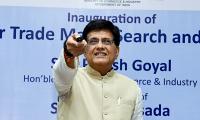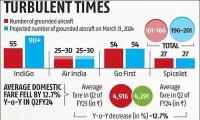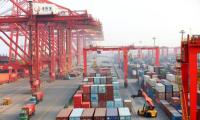NITI Aayog: Fiscal Incentives for Auto Components Manufacturing
x
NITI Aayog recommends fiscal incentives and cluster development for auto components manufacturing in India, aiming to boost exports and global competitiveness by 2030.

New Delhi, Apr 11 (PTI) NITI Aayog on Friday suggested the government to provide fiscal incentives for auto components manufacturing and to develop brownfield large-scale auto clusters for positioning India as a key player in global automotive markets.
The report titled "Automotive Industry: Powering India's Participation in Global Value Chains" was launched by NITI Aayog Vice Chairman Suman Bery.
The report envisions the country's automotive component production growing to USD 145 billion, with exports tripling from USD 20 billion to USD 60 billion by 2030.
"The government should provide operational expenditure (Opex) support to scale up manufacturing capabilities, with a focus on capital expenditure (Capex) for tooling, dyes, and infrastructure," it said.
It outlines several strategic fiscal and non-fiscal interventions aimed at enhancing India's global competitiveness in the automotive sector.
"The government should also support cluster development for fostering collaboration between firms through common facilities such as R&D and testing centres to strengthen the supply chain," it said.
While pitching for skill development initiatives to build a talent pipeline critical for sustaining growth, the report said there is a need for providing incentives for research, development, and international branding to improve product differentiation and empowering MSMEs through IP transfers.
The report also highlighted non-fiscal interventions, including simplifying regulatory processes, worker hour flexibility, supplier discovery & development and improving business conditions for automotive firms.
It also called for promoting joint ventures (JVs), foreign collaborations, and free trade agreements (FTAs) to expand global market access.
The report suggested that there is a need to encourage the integration of digital technologies and enhanced manufacturing standards to improve efficiency.
In 2023, the global automobile production reached approximately 94 million units.
The global automotive components market was valued at USD 2 trillion, with the export share reaching approximately USD 700 billion.
India has emerged as the fourth-largest global producer after China, the US and Japan, with an annual production of nearly 6 million vehicles.
Despite being the fourth-largest automobile producer globally, India has a modest share (around 3 per cent) in the global automotive component trade, which amounts to approximately USD 20 billion.
The bulk of global trade in automotive components is driven by engine components, drive transmission, and steering systems, but India's share in these high-precision segments remains low at just 2-4 per cent.
India's automotive sector faces challenges on account of operational cost, infrastructural gaps, moderate GVC integration, inadequate R&D expenditure etc that hinder its competitiveness in the global value chain.
The report titled "Automotive Industry: Powering India's Participation in Global Value Chains" was launched by NITI Aayog Vice Chairman Suman Bery.
The report envisions the country's automotive component production growing to USD 145 billion, with exports tripling from USD 20 billion to USD 60 billion by 2030.
"The government should provide operational expenditure (Opex) support to scale up manufacturing capabilities, with a focus on capital expenditure (Capex) for tooling, dyes, and infrastructure," it said.
It outlines several strategic fiscal and non-fiscal interventions aimed at enhancing India's global competitiveness in the automotive sector.
"The government should also support cluster development for fostering collaboration between firms through common facilities such as R&D and testing centres to strengthen the supply chain," it said.
While pitching for skill development initiatives to build a talent pipeline critical for sustaining growth, the report said there is a need for providing incentives for research, development, and international branding to improve product differentiation and empowering MSMEs through IP transfers.
The report also highlighted non-fiscal interventions, including simplifying regulatory processes, worker hour flexibility, supplier discovery & development and improving business conditions for automotive firms.
It also called for promoting joint ventures (JVs), foreign collaborations, and free trade agreements (FTAs) to expand global market access.
The report suggested that there is a need to encourage the integration of digital technologies and enhanced manufacturing standards to improve efficiency.
In 2023, the global automobile production reached approximately 94 million units.
The global automotive components market was valued at USD 2 trillion, with the export share reaching approximately USD 700 billion.
India has emerged as the fourth-largest global producer after China, the US and Japan, with an annual production of nearly 6 million vehicles.
Despite being the fourth-largest automobile producer globally, India has a modest share (around 3 per cent) in the global automotive component trade, which amounts to approximately USD 20 billion.
The bulk of global trade in automotive components is driven by engine components, drive transmission, and steering systems, but India's share in these high-precision segments remains low at just 2-4 per cent.
India's automotive sector faces challenges on account of operational cost, infrastructural gaps, moderate GVC integration, inadequate R&D expenditure etc that hinder its competitiveness in the global value chain.
You May Like To Read
TODAY'S MOST TRADED COMPANIES
- Company Name
- Price
- Volume
- Vodafone-Idea
- 11.36 ( -2.49)
- 94664837
- AvanceTechnologies
- 1.16 (+ 4.50)
- 34522155
- Sunshine-Capital
- 0.26 ( -3.70)
- 29015901
- Alstone-Textiles
- 0.27 ( -3.57)
- 28695959
- Mehai-Technology
- 1.65 ( -4.62)
- 28262795






